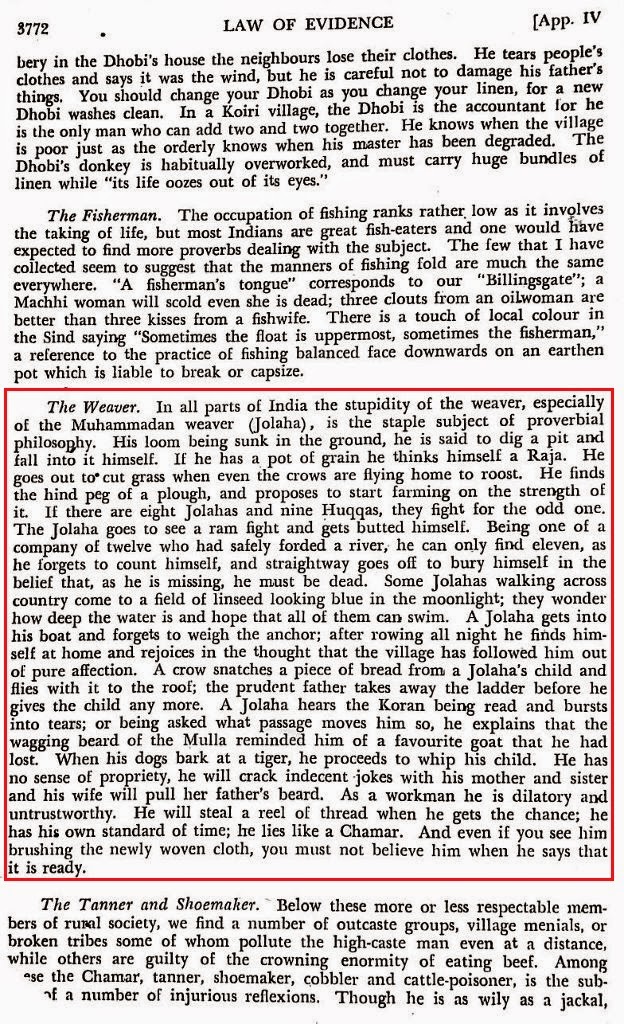"3772
, LAW OF EVIDENCE [App- IV
The
Weaver. In all parts of India the stupidity of the weaver, especially
of the Mohammadan weaver (julaha), is the staple subject of
proverbial philosophy. His loom being sunk in the ground, is said to
dig a pit and fall into it himself. If he has a pot of grain he
thinks himself a Raja. He goes out to cut grass when even the crows
are flying home to roost. He finds the hind peg of a plough, and
proposes to start farming on the strength of it. If there are eight
Jolahas and nine Huqqas, they fight for the odd one. The julaha goes
to see a ram fight and gets butted himself. Being one of a company
of twelve who had safely forded a river, he can only find eleven, as
he forgets to count himself, and straightway goes off to bury himself
in the belief that, as he is missing, he must be dead. Some julahas
walking across country come to a field of linseed looking blue in
the moonlight; they wonder how deep the water is and hope that all of
them can swim. A julaha gets into his boat and forgets to weigh the
anchor; after rowing all night he finds himself at home and rejoices
in the thought that the village has followed him out of pure
affection. A crow snatches a piece of bread from a ]ulaha‘s child
and flies with it to the roof; the prudent father takes away the
ladder before he gives the child any more. A julaha hears the Koran
being read and bursts into tears; or being asked what passage moves
him so, he explains that the wagging beard of the Mulla reminded him of a favorite goat that he had, lost. When his dogs bark at a tiger,
he proceeds to whip his child, He has no sense of propriety, he will
crack indecent jokes with his mother and sister and his wife will
pull her father's beard. As a workman he is dilatory and
untrustworthy. He will steal a reel of thread when he gets the chance
he has his own standard of time; he lies like a Chamar. And even if
you see ‘him brushing the newly woven cloth, you must not believe
him when he says that it is ready."
ऊपर
दिया गया चित्र Law of Evidence (commentary), Woodroffe and Amir Ali की
पुस्तक (Appendix-IV,
page 3772) का
है.
यह
पुस्तक के एक पुराने संस्करण
से लिया गया है.
कहते
हैं कि अंग्रेज़ जजों को भारतीय
जाति समूहों के बारे में कम
जानकारी होती थी सो उनकी सहूलियत
के लिए ये जानकारियाँ इस रूप
में दर्ज करके उपलब्ध कराई
जाती थीं. ऐसी जानकारियाँ देने के पीछे कौन सी मानसिकता कार्य कर रही थी इसका अनुमान सहज लगाया जा सकता है. सुना
है नए संस्करणों में ऐसा विवरण
नहीं है.
यदि
आपको मिले तो कृपया बताएँ.
MEGHnet

No comments:
Post a Comment